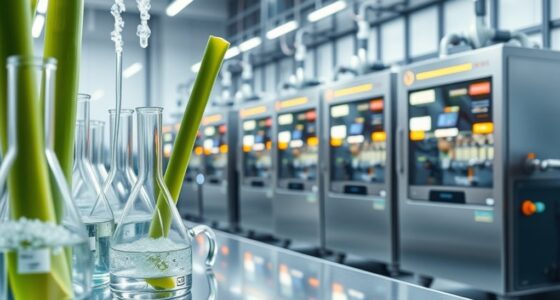Fair Trade coffee is your ticket to supporting ethical sourcing and sustainable agriculture. It guarantees farmers receive fair wages and empowers their communities through cooperative structures. When you choose Fair Trade, you're backing practices that promote environmental health, from organic farming to protecting biodiversity. Certification assures transparency, fair pricing, and safe working conditions. This coffee not only boosts local economies but also funds essential projects like education and healthcare. If you're curious about how Fair Trade differs from Direct Trade and want to discover sustainable brands, there's much more to explore beyond this introduction.
Key Takeaways
- Fair Trade Coffee ensures ethical sourcing, providing fair wages and improving livelihoods for smallholder farmers through cooperative structures.
- The certification process involves strict audits, establishing minimum price standards and promoting safe working conditions for producers.
- Fair Trade premiums fund community development initiatives, supporting education, healthcare, and infrastructure improvements in coffee-producing regions.
- Environmental sustainability is prioritized through organic farming, responsible water management, and practices that reduce agricultural runoff and chemical use.
- Fair Trade differs from Direct Trade by focusing on standardized pricing and third-party certification, while Direct Trade emphasizes personal relationships and quality-based pricing.
What Is Fair Trade Coffee?
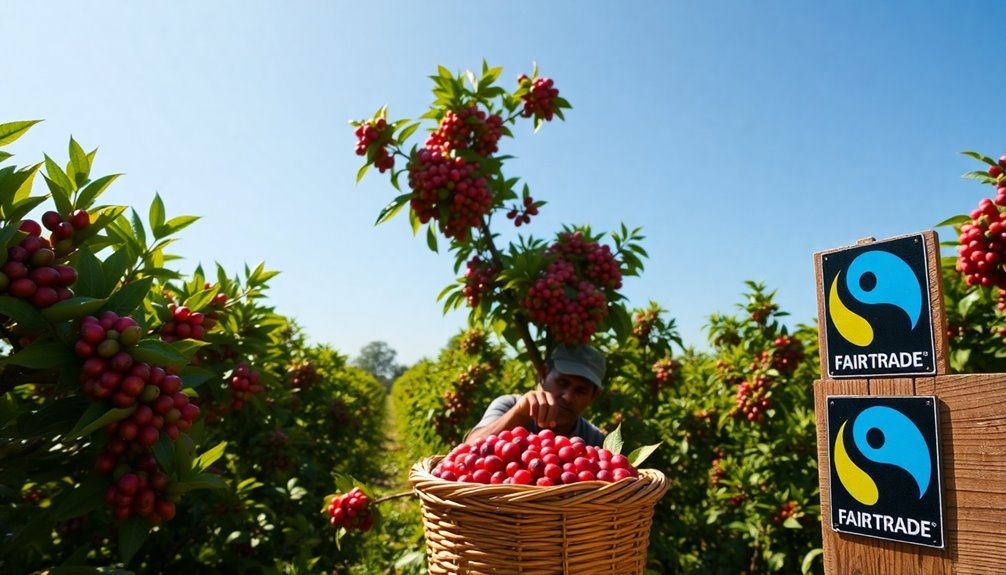
Fair Trade coffee represents a commitment to ethical sourcing and sustainable practices in the coffee industry. When you choose certified Fair Trade coffee, you're supporting farmers who receive fair prices for their crops, helping to combat pricing volatility.
This certification guarantees that these farmers can invest in environmentally sustainable farming methods, which often include organic practices that protect ecosystems. Additionally, Fair Trade coffee contributes to community development funds, enhancing living conditions for farmers and their families.
Since 1998, over $1 billion has been funneled into these initiatives, empowering coffee producers and fostering strong communities. Embracing Fair Trade coffee means you're not just enjoying a great cup of coffee; you're also making a positive impact on the lives of those who grow it.
Certification Process for Fair Trade
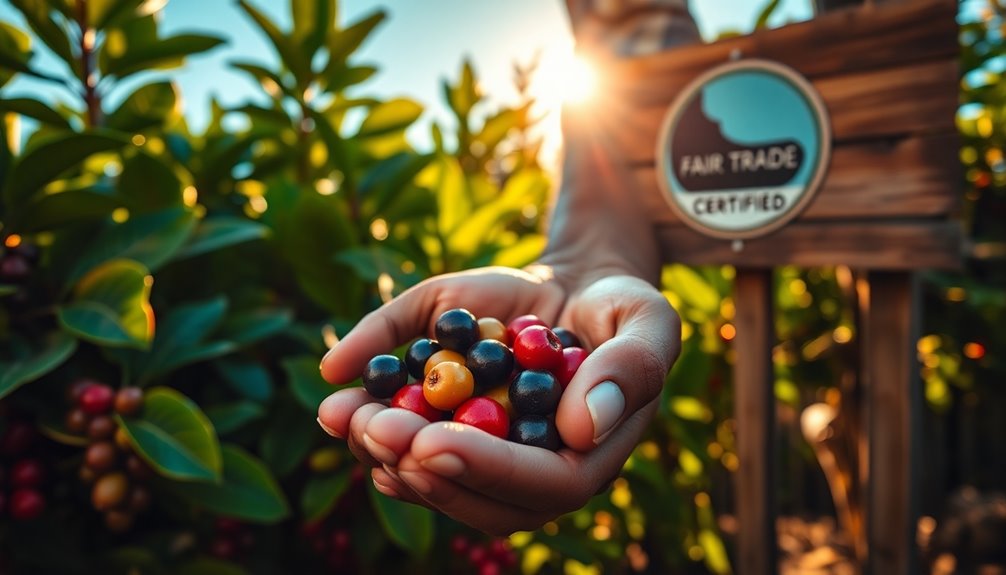
To achieve Fair Trade certification, coffee producers must navigate a detailed process that includes strict audits and compliance checks. This guarantees they meet Fair Trade standards focused on sustainable farming and fair labor practices.
You'll need to adhere to established minimum price standards, which provide a financial safety net against market fluctuations. While the certification process can be resource-intensive, it promotes transparency in the supply chain, allowing consumers to trace their coffee back to certified producers.
Additionally, as part of compliance, producer groups are encouraged to establish Community Development Funds, supporting local initiatives and enhancing community sustainability. This all-encompassing approach guarantees that both producers and consumers benefit from fair compensation practices.
Fair Trade vs. Direct Trade
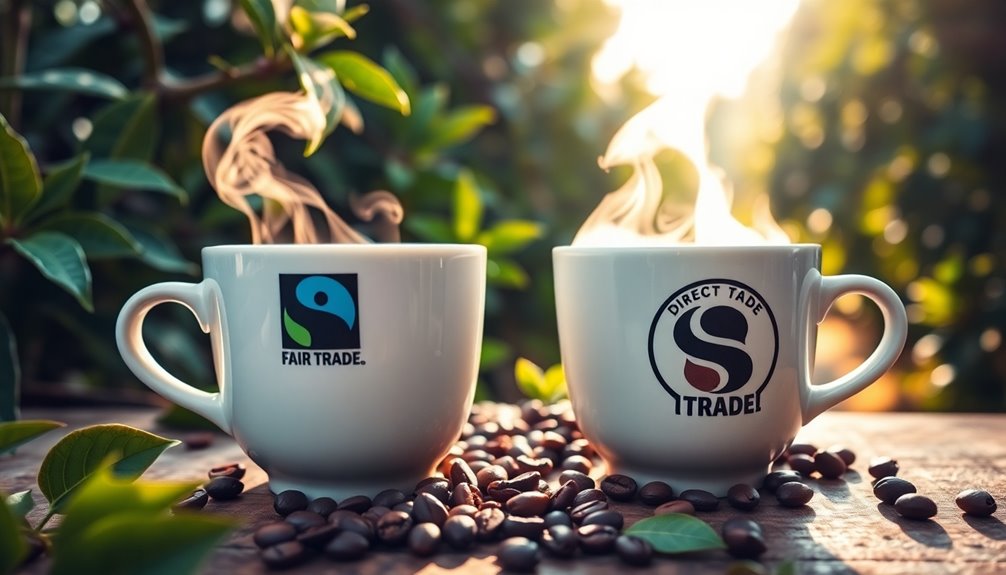
While both Fair Trade and Direct Trade aim to support coffee producers, they do so through different approaches that reflect varying philosophies about sourcing and compensation. Fair Trade certified coffee focuses on established standards set by organizations, ensuring fair compensation with a minimum price guarantee. In contrast, Direct Trade relationships foster personal connections between roasters and farmers, emphasizing quality whether in direct trade and allowing for flexible pricing based on the coffee's unique attributes.
| Aspect | Fair Trade |
|---|---|
| Certification | Third-party standards |
| Pricing | Minimum price guarantee |
| Focus | Fair compensation |
| Flexibility | Less flexible |
| Quality | Standardized Fair Trade premium |
Both models promote sustainable coffee, but your choice may reflect your values regarding certification versus relationships.
Importance of Fair Trade Coffee
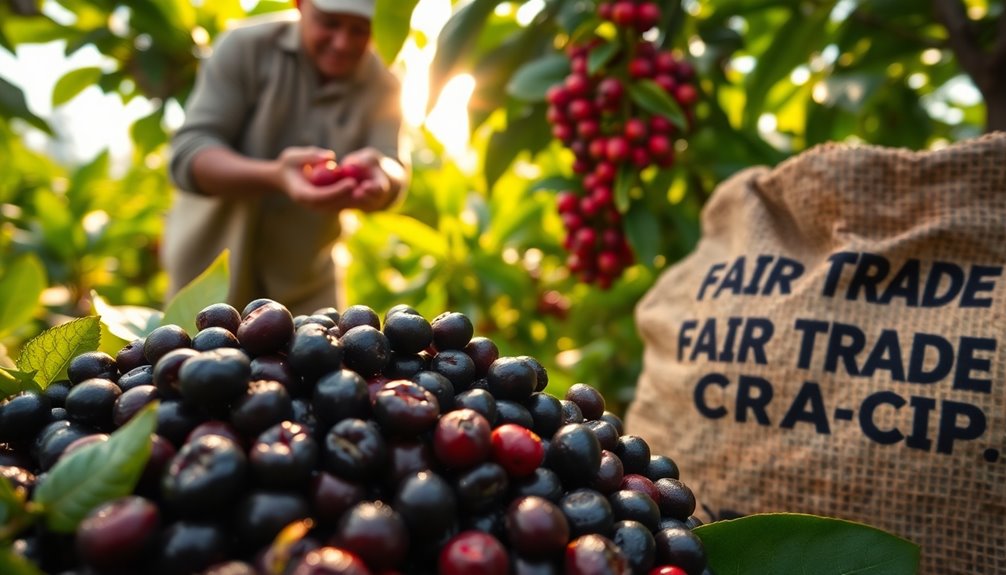
Understanding the differences between Fair Trade and Direct Trade highlights the importance of Fair Trade coffee in supporting farmers and their communities.
The Fair Trade certified label guarantees a minimum price for coffee beans, providing financial stability for farmers and protecting them from market fluctuations. This stability has led to over $1 billion in benefits since 1998, greatly improving the quality of life for many.
The Fair Trade premium supports community projects, enhancing access to education and healthcare. By choosing Fair Trade coffee, you empower small-scale farmers, giving them better negotiating power and control over their livelihoods.
Additionally, Fair Trade promotes environmentally sustainable farming practices, encouraging organic methods that support biodiversity and improve coffee quality.
Economic Benefits for Farmers
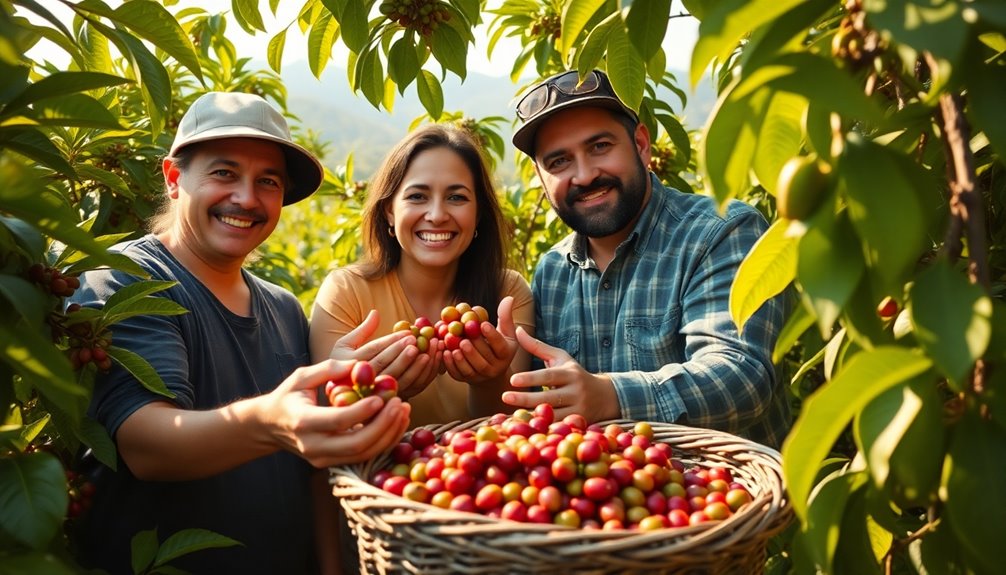
When you choose Fair Trade coffee, you're directly supporting economic stability for farmers. This choice leads to several key benefits:
- Financial Stability: Farmers receive premiums above commodity prices, ensuring protection against market fluctuations.
- Improved Living Conditions: Since 1998, over $1 billion has been delivered through Fair Trade, greatly enhancing farmers' lives.
- Empowered Communities: Cooperative structures foster greater negotiating power, allowing farmers to control their livelihoods and invest in their futures.
These Fair Trade premiums fund essential social and economic projects like education, healthcare, and infrastructure development, driving long-term economic sustainability. Additionally, financial stability can be further enhanced through mechanisms like annuities that provide consistent income despite rising costs.
Environmental Impact of Fair Trade
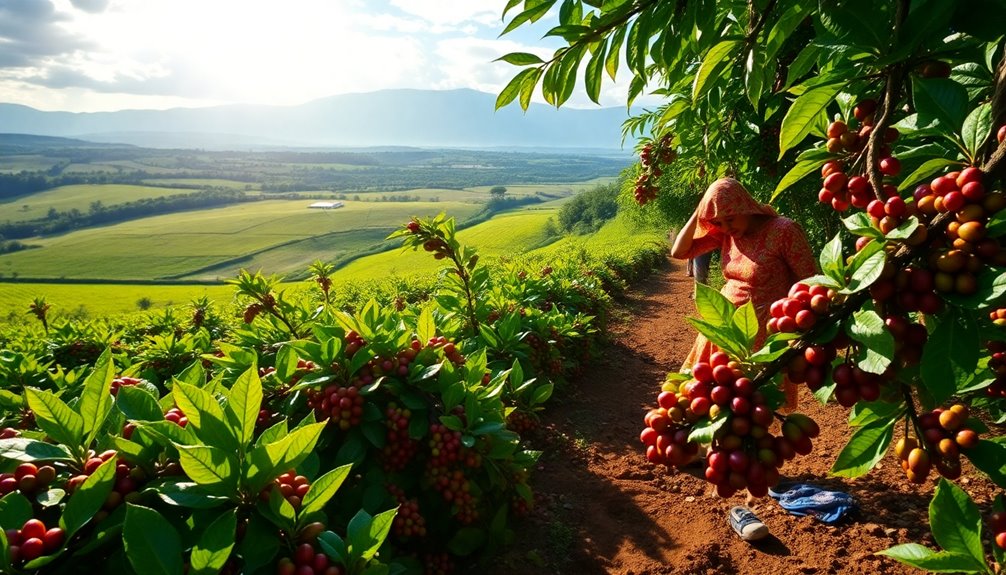
Choosing Fair Trade coffee not only supports farmers economically but also has a positive impact on the environment. Fair Trade practices promote organic farming methods, which reduce harmful pesticides and chemicals, fostering healthier ecosystems.
By encouraging shade-grown coffee, it helps preserve biodiversity and provides habitats for various species, including birds. Sustainable water management is a key focus, safeguarding local water sources and minimizing the environmental footprint of coffee production.
Additionally, Fair Trade promotes composting and recycling, enhancing soil health while minimizing waste. By supporting local farming practices, you help reduce agricultural runoff, contributing to overall ecosystem health and long-term sustainability in coffee cultivation.
Your choice truly matters in protecting our planet while enjoying your favorite brew.
Getting Involved in Fair Trade
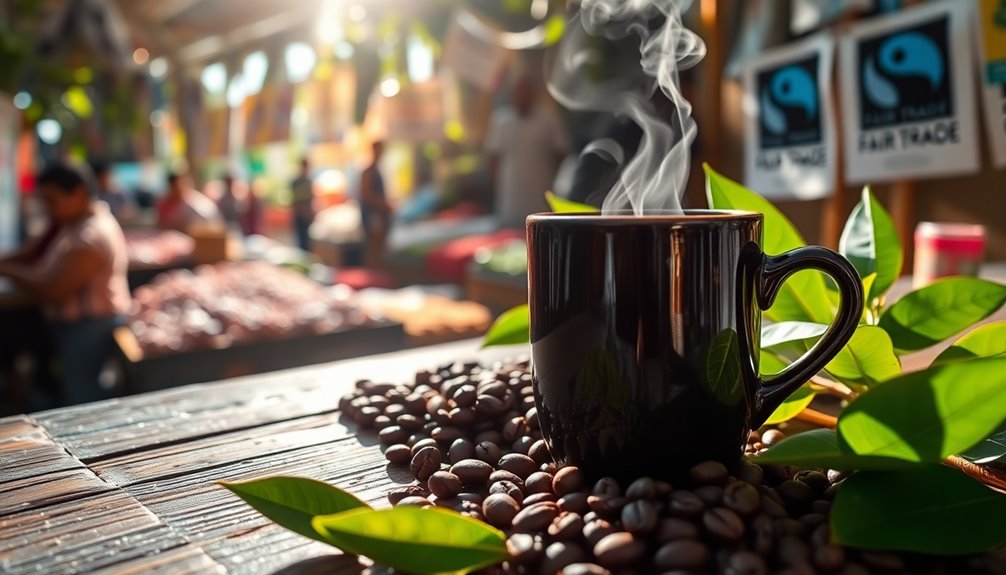
How can you make a difference in the world of coffee? By getting involved in Fair Trade, you can support ethical sourcing and help elevate the coffee industry. Here's how:
- Join a community of conscious consumers dedicated to promoting Fair Trade coffee and its benefits.
- Participate in local initiatives like farmers' markets or awareness campaigns that highlight supporting fair trade practices.
- Advocate for ethical sourcing in cafes and local businesses, encouraging them to adopt Fair Trade standards.
Stay updated on Fair Trade news to enhance your knowledge and spread the word.
Sharing information about the impact of ethical coffee sourcing fosters a culture of conscious consumption, encouraging others to reflect on the importance of Fair Trade in their coffee choices.
Sustainable Coffee Brands to Consider
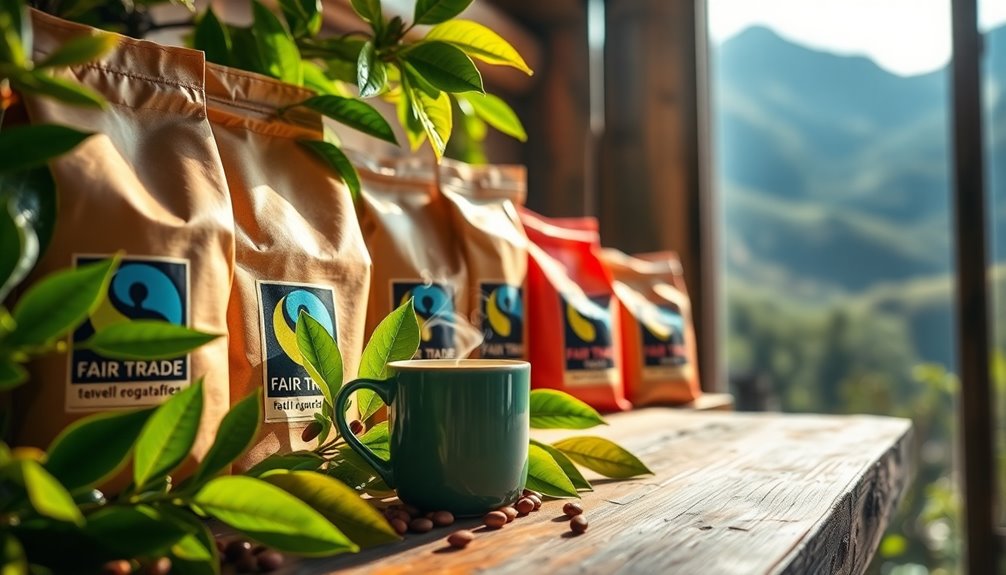
When you're choosing a sustainable coffee brand, look for ones that prioritize ethical sourcing practices and community impact initiatives. Brands like Equal Exchange and Counter Culture Coffee not only support farmers but also invest in their communities. Plus, many of these companies are adopting sustainable packaging options, making it easier for you to enjoy your coffee responsibly. Additionally, consider how these brands contribute to diversification strategy in their sourcing, which helps support various farming communities and reduce risks associated with reliance on single sources.
Ethical Sourcing Practices
As you explore the world of sustainable coffee, it's essential to contemplate brands that prioritize ethical sourcing practices.
These brands not only guarantee quality but also contribute to the fair trade benefit for farmers.
Consider these sustainable coffee brands:
- Equal Exchange – Known for its Fair Trade certifications and direct relationships with farmers, promoting transparency in supply chains.
- Stumptown Coffee Roasters – Emphasizes organic farming methods, enhancing environmental protection while supporting local communities.
- Intelligentsia Coffee – Focuses on sustainable packaging options, like compostable coffee pods, minimizing environmental impact.
Community Impact Initiatives
Sustainable coffee brands not only focus on ethical sourcing but also make significant contributions to the communities where their coffee is grown.
Brands like Equal Exchange and Intelligentsia reinvest profits into community development projects, enhancing education and healthcare for coffee-producing areas.
Grounds for Change prioritizes Fair Trade coffee and organic practices, promoting sustainable farming that benefits both the planet and farmers.
Companies like Peace Coffee engage in direct trade, allowing them to provide higher premiums and support initiatives that improve local infrastructure and working conditions.
A portion of the Fair Trade premium goes into Community Development Funds, empowering farmers to invest in clean water access and cooperative facilities.
Brands like Stumptown Coffee Roasters emphasize transparency in their supply chain, showcasing the positive community impacts of fair wages.
Sustainable Packaging Options
While the taste of your coffee is essential, the packaging it comes in matters just as much. Choosing brands that prioritize eco-friendly packaging can make a difference.
Here are three sustainable options to take into account:
- Compostable bags: Brands like Blue Bottle Coffee use these to minimize waste.
- Recyclable containers: Counter Culture Coffee guarantees their packaging is easily recyclable, reducing environmental impact.
- Minimalistic designs: Stumptown Coffee Roasters offers subscription services with streamlined packaging to cut down on excess.
Frequently Asked Questions
How Can I Identify Fair Trade Coffee Products?
To identify fair trade coffee products, start by looking for certification labels like Fair Trade Certified or Rainforest Alliance on the packaging.
These certifications guarantee ethical sourcing and fair wages for farmers. You can also check the brand's website for transparency about their sourcing practices.
Additionally, consider visiting local coffee shops that prioritize fair trade options or ask your favorite retailers about their selection.
Supporting fair trade means you're making a positive impact on communities!
What Are the Main Challenges Facing Fair Trade Coffee?
The main challenges facing fair trade coffee include fluctuating market prices, which can undermine the financial stability of farmers. These price fluctuations create an unpredictable environment for farmers, making it difficult for them to plan for their future and invest in their farms. Additionally, the economics of coffee supply chains often favor large corporations, leaving smallholder farmers with a minimal share of the profits. As a result, many fair trade coffee producers struggle to compete, which can lead to a cycle of poverty and dependency on external support.
You'll also encounter issues like a lack of awareness among consumers, making it harder for fair trade products to compete.
Additionally, not all certifications maintain strict standards, leading to confusion and skepticism.
Finally, climate change impacts coffee quality and yields, putting further pressure on farmers committed to fair trade practices.
Are There Any Certifications Exclusive to Fair Trade Coffee?
Imagine you're sipping a cup of coffee certified by Fair Trade USA. This certification guarantees that the coffee you enjoy meets specific ethical standards.
Other exclusive certifications, like the Rainforest Alliance, also focus on sustainability, but Fair Trade emphasizes fair wages for farmers.
By choosing Fair Trade certified coffee, you're directly supporting these farmers and their communities, assuring they receive a fair price for their hard work and dedication.
It's a win-win!
How Does Fair Trade Coffee Affect Local Communities?
Fair trade coffee positively impacts local communities by ensuring farmers receive fair wages and fostering sustainable practices.
When you support fair trade, you're helping to improve living conditions, access to education, and healthcare. It empowers farmers to invest in their communities and promotes environmental sustainability.
Can Fair Trade Coffee Be Organic as Well?
Fair trade coffee and organic coffee might seem like two separate worlds, but they can actually blend beautifully.
You can find fair trade coffee that's also organic, meaning it supports ethical practices while promoting sustainable farming.
When you choose this combo, you're not just enjoying a great cup; you're also supporting farmers who prioritize the environment.
Conclusion
In choosing fair trade coffee, you're not just savoring a delicious cup; you're making a powerful statement about compassion and justice. Every sip supports farmers working for a better life and protects the planet we all share. So, next time you brew your morning coffee, remember: your choice can spark change. Will you raise your mug to a brighter future for those who cultivate the beans? Together, we can brew a better world, one cup at a time.




